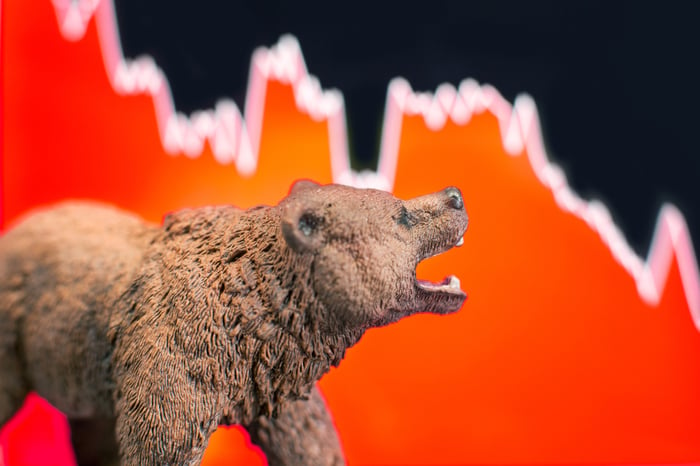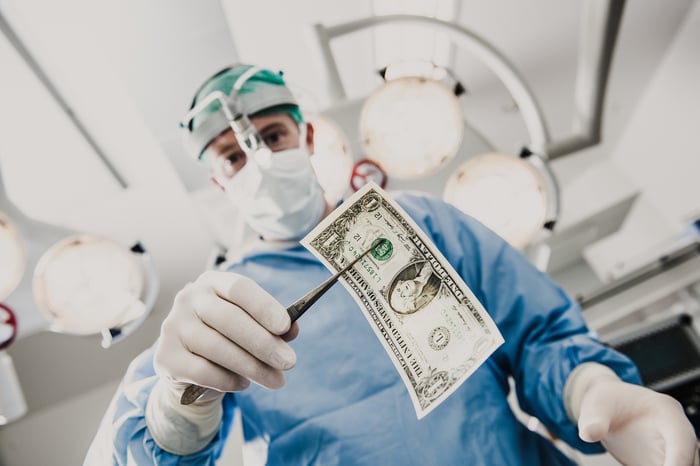It's been quite the year for the investing community. Since hitting all-time closing highs during the first week of January, the benchmark S&P 500 and widely followed Dow Jones Industrial Average have both entered correction territory (i.e., a decline of at least 10%).
Meanwhile, things are even worse for the growth-dependent Nasdaq Composite (^IXIC -1.89%). Following its all-time high in November 2021, the Nasdaq has tumbled 27%. In fact, on May 5, the index endured one of its worst single-session performances in history (a 647-point decline). The Nasdaq's tumble officially places it in a bear market.

Image source: Getty Images.
Although the velocity of moves lower in the broader market can, at times, be nerve-racking during a bear market, history shows that putting your money to work during these spikes in volatility is a smart move. That's because every major downturn in the stock market has eventually been wiped away by a bull market rally.
However, this doesn't mean you have to be a hero and try to catch a falling knife. Instead, buying safe stocks that are trading at a discount can be highly rewarding during a bear market. What follows are three extremely safe stocks you'll regret not buying on the dip.
Microsoft
The first incredibly safe stock investors can confidently scoop up on the dip is software behemoth Microsoft (MSFT -1.28%).
Considering what's happened with tech stocks of late, some folks might be leery of putting their money to work in Ole Softy. However, this is one of the few companies to respond well after delivering its quarterly earnings. Further, its five-year monthly beta of 0.91 implies that its 9% less volatile than the benchmark S&P 500.
One of the coolest things about Microsoft that few people are aware of, and what makes it such a safe stock, is its credit quality. Only two publicly traded companies sport the highly coveted AAA credit rating from Standard & Poor's (S&P), and Microsoft is one of the two. This is a company with $104.7 billion in cash ($26.7 billion net cash) that generated $87.1 billion in operating cash flow over just the past 12 months. Even with $78 billion in combined debt and operating lease liabilities, S&P has the utmost confidence Microsoft will make good on its obligations.
From an operating standpoint, Microsoft is relying on its legacy segments for top-tier margins and cash flow, while leaning on cloud solutions to an increasing degree for its growth.
For instance, data from GlobalStats notes that Windows has accounted for 73% to 76% of operating system market share globally over the trailing year (ended April 2022). Even if sales flatline for Windows, the cash flow from this segment can be used to push higher-growth initiatives or to help facilitate acquisitions.
Meanwhile, cloud solutions are growing like wildfire. Azure is the world's No. 2 cloud infrastructure solution, based on enterprise spend, with sales rising by 49% on a constant currency basis in Microsoft's fiscal third quarter (ended March 31, 2022). The beauty of cloud infrastructure is that it's still in the early innings of its growth and it's producing some very juicy operating margins.
Considering that Wall Street expects Microsoft to grow sales by 15% or more annually, its forward-year price-to-earnings ratio of 25 is quite reasonable.

Image source: Getty Images.
Johnson & Johnson
A second extremely safe stock investors can buy into during the Nasdaq bear market swoon is healthcare conglomerate Johnson & Johnson (JNJ 1.79%). Based on a five-year monthly beta of 0.72, J&J is considerably less volatile than the S&P 500.
As noted, only two publicly traded companies have a AAA credit rating from S&P. Microsoft is one and Johnson & Johnson is the other. To put this into context, the U.S. federal government has been given a AA credit rating by S&P. This means the rating agency has more faith in J&J making good on its outstanding debts than it does of the U.S. government doing the same. That should help nervous investors sleep better at night.
Something else to consider is the defensive nature of the healthcare sector. No matter how high inflation goes, or how poorly the U.S. economy performs, people still get sick and require care. This sets a base level of demand for prescription drugs, medical devices, and healthcare services. It effectively means that recessions don't have much of an effect on J&J's diverse healthcare operations.
Another reason J&J has been such a superstar for investors is the fact that each of its operating segments brings something important to the table. For instance, even though brand-name pharmaceuticals have a finite period of exclusivity, the margins and sales growth potential from prescription drugs is what generates the bulk of J&J's operating margin. To hedge against exclusivity losses, the company leans on medical devices, which are perfectly positioned to benefit from an aging boomer population, and consumer health products, which is a segment J&J will soon be spinning off. Although the latter is slow growing, it provides excellent pricing power and predictable cash flow.
As a final note, Johnson & Johnson has increased its base annual payout in each of the past 60 years, and prior to the COVID-19 pandemic had grown its annual adjusted earnings for around 35 consecutive years.

Image source: Getty Images.
AT&T
The third safe stock that investors will regret not buying on the Nasdaq bear market dip is telecom company AT&T (T -1.77%). AT&T is the least volatile stock on this list, with a beta of just 0.65.
For years, historically low lending rates and dovish monetary policy rolled out the red carpet for growth stocks while slow and steady companies like AT&T were left in the dust. But as interest rates start climbing and valuations come back into focus, AT&T's forward-year earnings multiple of seven and some change looks quite tempting.
Although AT&T isn't the growth story it was three decades ago, the company still has plenty of opportunity to move the needle over time. Right now, the clearest catalyst is the 5G revolution.
Upgrading wireless infrastructure to support 5G speeds is going to be costly and won't happen overnight. On the other hand, it's been roughly a decade since wireless download speeds were last meaningfully improved. The ability to speed up downloads should prove enticing for consumers and businesses, and is expected to lead to a multiyear device replacement cycle. The key here is that data consumption should grow as 5G access spreads -- and data is where the juiciest margins can be made from AT&T's wireless segment.
AT&T is also a big beneficiary of the recent spinoff of content arm WarnerMedia, which was subsequently merged with Discovery to create Warner Bros. Discovery. When the deal closed last month, AT&T received $40.4 billion in cash. Further, AT&T announced well in advance of the deal's completion that it would be lowering its annual payout. Between the $40.4 billion in cash and the reduced payout, AT&T should have plenty of capital to tackle its high debt levels.
With a low price-to-earnings ratio, inflation-fighting 5.7% yield, and improving financial flexibility, AT&T checks all the right boxes for conservative investors.





